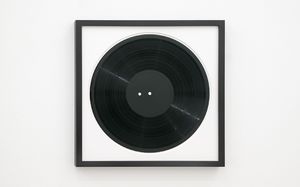Workshop de Karawane, Black Sound White Cube
De erg
Révision datée du 18 juillet 2019 à 13:29 par Ergbot (discussion | contributions) (Page créée avec « {{Actualités |Subtitle=13.10.2014 de 15h00 à 19h00 |Start= |End= |Published=2014/09/25 |Image=444a9c3e-d83c299-27730.jpg |Spipid=819 |Description=<div class="listagetext... »)
| Actualités | |
|---|---|
| Publiée | 2014/09/25 |
Black Sound White Cube
Monday, October 13, 2014, 3pm – 7 pm
Dubplate „The Fine Art of Living“, Ina Wudtke, 2009
In the frame of the course “Performance et régimes performatifs en art depuis le XXème siècle” of Christophe Wavelet, Karawane invites Ina Wudtke (artist, Berlin) and Dieter Lesage (philosopher, Berlin) to present their shared work under the title Black Sound White Cube, that took the double form of an exhibition at KunstQuartier Bethanien in Berlin (2011) and of an eponymous book (Vienna, Loecker Verlag, 2010). Wudtke and Lesage start from the diagnosis that the white cube not only looks white but also sounds white, which means that it reproduces a racialized cultural hegemony and contributes to the persistence of lines of social division. As a consequence they state that “in order for more people to recognize black sound as black sound in the white cube […] the white cube will need to do more than repaint its walls. The white cube will need to rethink it’s ‘audiology’”.
We will discuss strategies to shift the invisible borders of the spaces of contemporary art, just as much in terms of the divisions between ‘popular culture’ and ‘fine arts’, than in those of race and gender. We further ask if the widely generalised absence of black music in the white cube does preserve it from an appropriation and capture that transforms frequently the terms of speech in the sphere of fine arts ? To ask provocatively, in order to be able to properly hear black sound, may it be necessary to leave the white cube ?
The session will be in English.
Bios
Dieter Lesage
After the obtention of his Doctorate in Philosophy, Dieter Lesage (1966) was a research-assistant at the National Scientific Research Foundation of Belgium (1989-1993), a post-doctoral researcher at the Institute of Philosophy of the Catholic University of Louvain (1993-1995) and a scientific attaché at the Center of European Culture of the Royal Academy of Sciences, Letters and the Arts of Belgium (1994).
Dieter Lesage was a visiting professor at the Piet Zwart Institute of the Willem De Kooning Academie (Hogeschool Rotterdam) (2003-2005) and full-time visiting professor at the Institut für Kulturtheorie of the Leuphana Universität Lüneburg (2007). He is a member of the Editorial Board of Afterall. A Journal of Art, Context and Enquiry (London-Los Angeles) and member of the International Advisory Board of Art & Research. A Journal of Ideas, Contexts and Methods (Glasgow). He is the author of, among others, Peut-on encore jouer Hamlet ?, Paris, Les Impressions Nouvelles, 2002 [Can one still play Hamlet ?] ; Vertoog over verzet. Politiek in tijden van globalisering, Amsterdam/Antwerpen, Meulenhoff/Manteau, 2004 [Discourse on Resistance. Politics in the times of globalisation]. With Kathrin Busch, he is a co-editor of A Portrait of the Artist as a Researcher : The Academy and the Bologna Process, Antwerp, MuHKA, 2007. With Jan Blommaert, Eric Corijn and Marc Holthof, he is a co-author of Populisme [Antwerp, EPO, 2004]. With Belgian artist Herman Asselberghs, he edited the book Het museum van de natie. Van kolonialisme tot globalisering (Brussels, Yves Gevaert, 1999) and wrote the script for Asselberghs' video After Empire, which has been designed and published as an eponymous book by AraMER (Ghent, 2013).
As of October 1, 2013, Dieter Lesage took office as the new Director of RITS | School of Arts (Erasmus University College Brussels), where he taught, since 1998, arts, politics and culture.
Ina Wudtke
Ina Wudtke (1968) is a German artist. Her work addresses issues of sound, performance, identity, work, gender and urban housing. Exhibitions include The Very Last Judgment Triptych (xhibit, Academy of Fine Arts Vienna, 2014), Strut Your Stuff (Hebbel Am Ufer Theater, Berlin, 2013), Incheon Women Artists’ Biennial (Incheon, South Korea, 2011), Black Sound White Cube (Kunstquartier Bethanien, Berlin 2011), Griot Girl (solo exhibition at Beursschouwburg, Brussels and Kjubh, Cologne 2010), A Portrait of the Artist as a DJ (solo exhibition, Studio Voltaire London, 2007). Ina Wudtke lives and works in Berlin.
www.ina wudtke.com
